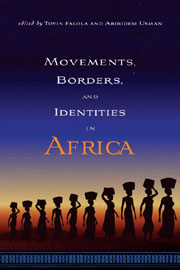Book contents
- Frontmatter
- contents
- Preface
- Introduction: Migrations in African History: An Introduction
- PART A State Formation and Migration Crossroads
- PART B Movements and Identities
- 6 Squatting and Settlement Making in Mamelodi, South Africa
- 7 “Scattering Time”: Anticolonial Resistance and Migration among the Jo-Ugenya of Kenya toward the End of the Nineteenth Century
- 8 Traders, Slaves, and Soldiers: The Hausa Diaspora in Ghana (Gold Coast and Asante) in the Nineteenth and Early Twentieth Centuries
- 9 Ethnic Identities and the Culture of Modernity in a Frontier Region: The Gokwe District of Northwestern Zimbabwe, 1963–79
- 10 Displacement, Migration, and the Curse of Borders in Francophone West Africa
- 11 Shifting Identities among Nigerian Yoruba in Dahomey and the Republic of Benin (1940s–2004)
- 12 Identity, “Foreign-ness,” and the Dilemma of Immigrants at the Coast of Kenya: Interrogating the Myth of “Black Arabs” among Kenyan Africans
- 13 Labor Market Constraints and Competition in Colonial Africa: Migrant Workers, Population, and Agricultural Production in Upper Volta, 1920–32
- List of Contributors
- Index
13 - Labor Market Constraints and Competition in Colonial Africa: Migrant Workers, Population, and Agricultural Production in Upper Volta, 1920–32
from PART B - Movements and Identities
Published online by Cambridge University Press: 12 September 2012
- Frontmatter
- contents
- Preface
- Introduction: Migrations in African History: An Introduction
- PART A State Formation and Migration Crossroads
- PART B Movements and Identities
- 6 Squatting and Settlement Making in Mamelodi, South Africa
- 7 “Scattering Time”: Anticolonial Resistance and Migration among the Jo-Ugenya of Kenya toward the End of the Nineteenth Century
- 8 Traders, Slaves, and Soldiers: The Hausa Diaspora in Ghana (Gold Coast and Asante) in the Nineteenth and Early Twentieth Centuries
- 9 Ethnic Identities and the Culture of Modernity in a Frontier Region: The Gokwe District of Northwestern Zimbabwe, 1963–79
- 10 Displacement, Migration, and the Curse of Borders in Francophone West Africa
- 11 Shifting Identities among Nigerian Yoruba in Dahomey and the Republic of Benin (1940s–2004)
- 12 Identity, “Foreign-ness,” and the Dilemma of Immigrants at the Coast of Kenya: Interrogating the Myth of “Black Arabs” among Kenyan Africans
- 13 Labor Market Constraints and Competition in Colonial Africa: Migrant Workers, Population, and Agricultural Production in Upper Volta, 1920–32
- List of Contributors
- Index
Summary
People from the French colony of Upper Volta were the major contributors to efforts of the federal government of French West Africa (Afrique occidentale française, or AOF) to develop other colonies in the federation. In a word, the colonial government put them to work. The decision to carve the colony of Upper Volta out of AOF territory coincided with another decision, to extend existing railroads and also build another that crossed the federation. On railway construction sites, Voltaic workers replaced forced labor mobilized from the other colonies that were, in fact, slated to benefit from the projects. Voltaic railroad workers were indeed so important that the federal government appointed a special delegate to work with the administrations of the colonies to help coordinate their deployment. Prior to this time, businessmen in the AOF had been interested primarily in the quick profits derived from commercial exchange and the export of forest products. However, sharp rises in the prices of agricultural products led them to turn their attention to export agriculture. By the mid-1920s, for example, the government of the colony of Côte d'Ivoire received a flood of requests for concessions for commercial agriculture. As the need for labor became increasingly acute, French planters asked colonial officials in the neighboring colony of Upper Volta to help by recruiting labor for their needs. But was Upper Volta really in a situation to provide the migrant labor needed elsewhere in French West Africa?
- Type
- Chapter
- Information
- Movements, Borders, and Identities in Africa , pp. 285 - 304Publisher: Boydell & BrewerPrint publication year: 2009



